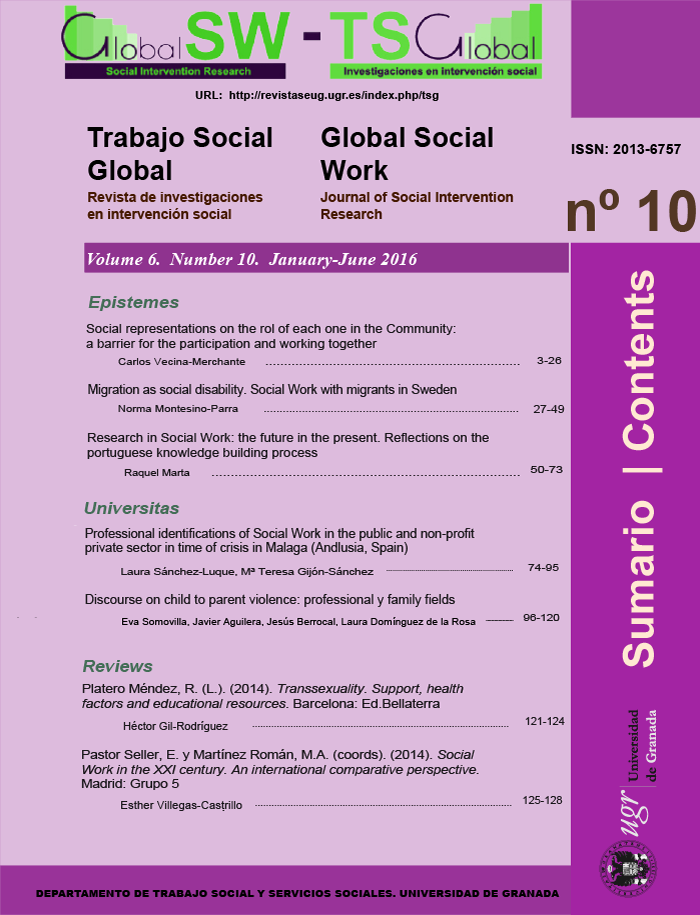Research in Social Work: the future in the present. Reflections on the portuguese knowledge building process
DOI:
https://doi.org/10.30827/tsg-gsw.v6i10.4084Keywords:
Social Work, scientific knowledge, identity, space-time dimension, reflexivityAbstract
The debate surrounding the construction of scientific knowledge within social work is discussed. The social work class seeks new foundations that allow within the context of structural change, the strengthening of professional identity and challenge of the vestiges of intellectual segregation that historical constraints have left. This paper seeks to outline a research strategy for reconciliation and coordination of intellectual and professional work in order to give visibility to new and different domains of interpretation and action, while claiming that considering pluri-perspectives potentiates the knowledge transformation process. Underlining this confluence of complex thinking elements, this article incorporates the space-time dimension and discusses and recognizes the unavoidable circularity as a way to interrogate knowledge that is compartmentalized and fragmented, placing an emphasis both on knowledge and on the interrelationship between knowing, doing, being and relating. In addition, examines the recognition of the nature of those relationships among various disciplines and perspectives.
Downloads
References
Adams, R., Dominelli, L. e Payne, M. (2009). Practising Social Work in a Complex World (2ª ed.).Basingstoke: MacMillan Press.
Albarello, L. et all, (1997). Práticas e Métodos de Investigação em Ciências Sociais. Lisboa: Gradiva.
Almeida, J. F. & Pinto, J. M. (1982). A Investigação nas Ciências Sociais. Lisboa: Presença.
Andrade, M. (2001). Serviço Social e Mutações do Agir na Modernidade. Tese de Doutoramento (Cap. III). São Paulo: PUC/SP.
Bachelard, G. (2008). O Novo Espírito Cientifico. Lisboa: Edições 70.
_________ (2009). A Filosofia do Não, (6ª ed.), Lisboa: Presença.
Baptista, M. V. (2001). A Investigação em Serviço Social. Lisboa, São Paulo: CPIHTS, Veras.
Beech, N. e Cairns, G. (2001). Coping with change: The contribution of postdichotomous ontologies, Human Relations, 54 (10), 1303-1324.
Branco, F. (2008). A Investigação em Serviço social em Portugal: Trajectórias e perspectivas. Locus Soci@l 1, 32-47. Disponível em: http://www.locussocial.cesss-ucp.com.pt/page4/files/page4_11.pdf
Castells, M. (2003). O Poder da Identidade – A Era da Informação: Economia, Sociedade e Cultura, Vol. II. Lisboa: Fundação Calouste Gulbenkian.
Corcuff, P. (2001). As Novas Sociologias. Sintra: VRAL, Lda.
Dominelli, L. (2004). Social Work: Theory and Practice for a Changing Profession. Cambridge: Polity Press.
Faleiros, V. P. (1999). Estratégias em Serviço Social. São Paulo: Cortez.
_________ (2001). Desafios do Serviço Social na era da globalização. Em Helena Mouro, & Dulce Simões (coord.), 100 anos de Serviço Social (pp. 313-349), Coimbra: Quarteto.
_________ (2013). Globalização, correlação de forças e Serviço Social. São Paulo: Cortez.
Giddens, A. (1989). A Constituição da Sociedade. São Paulo: Martins Fontes.
________ (2000). Dualidade da Estrutura – Agência e Estrutura. Oeiras: Celta.
Karsz, S. (2004). Pourquoi le travail social ?. Paris : Dunod.
Le Moigne, JL. (2007). The Intelligence of Complexity. Do the ethical aims of research and intervention in education and training not lead us to a “new discourse on the study method of our time?. Sísifo, 4, 115-126.
Martins, A. (1999). Serviço Social e Investigação. Em M. A.Negreiros, A. Martins, et all Serviço Social, Profissão & Identidade, que Trajectória? (pp. 45-65). Lisboa/São Paulo: Veras Editora.
________ (2002). Investigação em Serviço Social: perspectivas actuais. Em A. Henríquez, M. A. Farinha (Org.), Serviço Social: Unidade na Diversidade. Encontro com a Identidade Profissional (pp. 50-61), I Congresso Nacional de Serviço Social, Lisboa, Associação dos Profissionais de Serviço Social: Aveiro.
Morin, E. (1997). O Método I. A Natureza da Natureza (3ªed.). Mem Martins: Europa-América.
Morin, E. e Le Moigne JL. (2009). Inteligência da Complexidade. Lisboa: Piaget.
Negreiros, M. A. (1999). Qualificação Académica e Profissionalização do Serviço Social – o caso português. Em M. A.Negreiros, A. Martins, et all, Serviço Social, Profissão & Identidade, que Trajectória?. Lisboa/ São Paulo: Veras Editora.
Netto, J. P. (1996). Transformações Societárias e Serviço Social. Serviço Social e Sociedade, nº 50. São Paulo: Cortez.
Nunes, A. S. (2005). Questões preliminares sobre as Ciências Sociais. Queluz: Presença.
Payne, M.(1998). Social Work theories and reflective practice. Em R. Adams, L. Dominelli e M. Payne, (Eds.), Social Work: themes, issues and critical debates (pp.123-138). Basingstoke: Palgrave MacMillan.
_______ (2002). Teoria do Trabalho Social Moderno. Coimbra: Quarteto.
Rein, M., & White, S. H. (1981). Knowledge for Practice. Social Service Review, 55( 1), 1–41.
Santos, B. S. (1989). Introdução a uma Ciência Pós- Moderna. Porto: Afrontamento.
Wallerstein, I. (1996a). Le Futur des Sciences Sociales. Colecção Les Classiques des Sciences Sociales Disponível em : http://www.uqac.uquebec.ca/zone30/Classiques_des_sciences_sociales/index.html
Wallerstein, I. (1996b). Para abrir as Ciências Sociais: Relatório da Comissão Gulbenkian sobre a reestruturação das Ciências Sociais. Mem Martins: Publicações Europa-América.
Downloads
Published
How to Cite
Issue
Section
License
Authors publishing in this journal agree to the following terms:
- Authors retain their copyright. They guarantee to this journal the right to a first publication of the work submitted to initiate the editorial process.
- Authors know that their work is published under a Creative Commons License which allows others to share it, with a recognition of the work's authorship and its initial publication in this journal.
- Authors share with Global Social Work explotation rights of the work that has been published in this journal, authorizing the execution of a free reproduction, distribution and public communication. Authors know that their work will be stored on servers and reproduced in digital format for inclusion in institutional repositories and databases that will facilitates free access to the full text of the work.
- Authors may distribute the version of the work published in this journal (for example, to an institutional repository or publish it in a book), with the explicit acknowledgment of its initial publication in this journal.
Copyright on the texts published in Trabajo Social Global -Global Social Work, as well as editorial policy of the journal refering to self-file and deposit in institutional or thematic repositories, are identified in the database





















